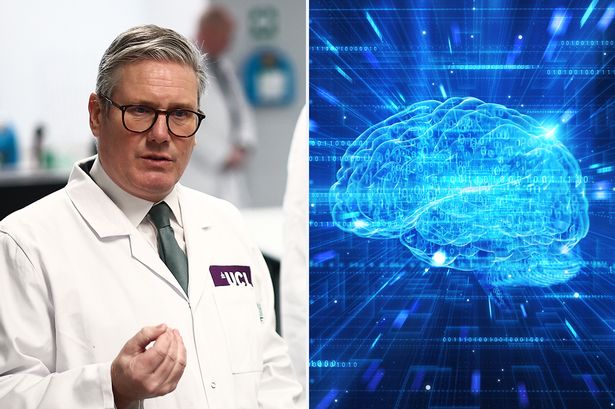Sir Keir Starmer, leader of the UK Labour Party, has unveiled an ambitious vision for the future of healthcare, centered on harnessing the power of artificial intelligence (AI) to revolutionize cancer diagnosis and treatment. Starmer’s proposed plan hinges on leveraging existing population data, including medical records, to proactively identify individuals at high risk of developing cancer, even before any discernible symptoms manifest. This preemptive approach aims to drastically reduce cancer mortality rates and improve patient outcomes by enabling earlier intervention and more personalized treatment strategies. This paradigm shift towards predictive healthcare represents a significant departure from the current reactive system, where diagnosis often occurs only after symptoms appear, potentially delaying crucial treatment and impacting survival chances.
The crux of Starmer’s proposal lies in the sophisticated analysis of vast datasets, encompassing medical histories, genetic predispositions, lifestyle factors, and environmental exposures. By applying advanced AI algorithms to this complex information, the system could identify patterns and correlations indicative of elevated cancer risk. For example, the AI might flag an individual with a family history of breast cancer, combined with certain genetic markers and lifestyle choices, as being at heightened risk, even before any physical signs emerge. This early warning system would empower healthcare professionals to offer targeted screening, preventative measures, and closer monitoring, potentially intercepting the disease in its nascent stages and significantly improving treatment efficacy. The utilization of AI promises to dramatically enhance the speed and accuracy of risk assessments, outperforming traditional methods that often rely on subjective clinical judgment and limited data points.
While the potential benefits of this AI-driven approach are immense, it is crucial to acknowledge and address the inherent complexities and challenges. Data privacy and security are paramount concerns, requiring robust safeguards to protect sensitive medical information from unauthorized access and misuse. The development and implementation of ethical guidelines for data usage and algorithmic transparency are essential to ensure responsible and equitable application of this technology. Furthermore, addressing potential biases within the datasets is crucial to prevent the system from perpetuating existing health inequalities. This includes ensuring diverse and representative data is utilized during the training phase of the AI algorithms to avoid biased outcomes that could disproportionately affect certain demographics.
Another critical aspect lies in the integration of this technology within the existing healthcare infrastructure. Significant investment in IT infrastructure, training for healthcare professionals, and development of seamless data sharing protocols will be necessary for successful implementation. Building public trust and addressing concerns about the use of AI in healthcare is also vital. Clear communication about the benefits, risks, and safeguards will be essential to foster public acceptance and encourage participation. Furthermore, ensuring equitable access to this advanced technology for all segments of the population, regardless of socioeconomic status or geographical location, is crucial to avoid exacerbating existing healthcare disparities.
Moreover, the success of this initiative hinges on the robust validation and continuous refinement of the AI algorithms. Rigorous clinical trials and ongoing monitoring of the system’s performance are essential to ensure accuracy, reliability, and safety. Collaboration between AI developers, healthcare professionals, and ethicists is crucial to address evolving challenges and optimize the system’s effectiveness. The development of explainable AI models is also critical to enhance transparency and build trust amongst clinicians and patients, enabling them to understand the rationale behind the system’s predictions and recommendations. This collaborative and iterative approach will be essential for the continuous improvement of the AI system and maximizing its potential to transform cancer care.
Ultimately, the realization of Sir Keir Starmer’s vision for AI-powered cancer prevention requires a multifaceted approach that encompasses technological innovation, robust ethical frameworks, significant infrastructural investment, and unwavering commitment to equitable access. By proactively addressing the challenges and maximizing the potential of this transformative technology, the UK has the opportunity to usher in a new era of personalized, predictive healthcare, significantly impacting cancer outcomes and improving the lives of millions. The successful implementation of this vision could serve as a model for other nations seeking to leverage AI for the betterment of public health and establish a more proactive and effective healthcare system.














